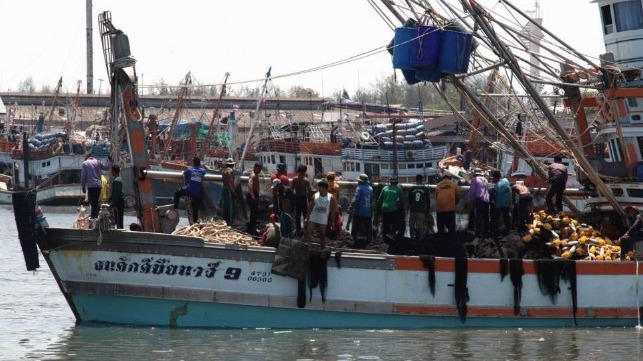Op-Ed: Fishing Industry Must Do More to Curb Human Rights Abuses

[By Chris Armstrong]
You might opt for a tin of “dolphin-friendly” tuna as one way of ensuring the seafood you buy is ethically sourced. Certain fishing methods and equipment can kill a lot of sealife that boats aren’t even targeting, by ensnaring marine mammals or drowning seabirds. It’s important to consider how sustainable our choices are when shopping, but how can you guarantee that the people who catch your seafood are well treated?
The average consumer may not realize it, but the fishing industry is also tied to some horrific abuses of human rights. In putting a meal on the table, you may also be helping to sustain patterns of exploitation and abuse at sea.
Several reports have highlighted that some sectors of the fishing industry continue to use forced labor and physical punishment, and even deliberately kill workers. Fishers can be extremely vulnerable while at sea, far out of sight of law enforcement agencies or help from friends and family.
Changes within the industry have exacerbated the problem. Factory ships, which were first seen in the whaling industry, are now commonly sighted processing fish in the waters of many states. Smaller fishing vessels now visit them to offload their catches rather than returning to shore themselves. The result is that some fishers now spend weeks or months aboard, isolated from support networks on land.
Many boats sail under “flags of convenience”, which means that their owners have registered them with a country that will not extend any real scrutiny over working conditions. Despite international agreements that notionally protect workers, employers can exploit these enforcement gaps to ignore workers’ rights.
The global epicenter of abuse is the Gulf of Thailand – the main source of prawns for the UK and US market. A survey by the International Labor Organization found that at least one in six workers in the region had either been coerced or deceived into working against their will.
But forced labor has even been reported in the coastal waters of countries thought to have much stronger worker protections, such as the UK and New Zealand. These abuses are still largely invisible to people buying seafood or fish-based products, including dietary supplements and pet food. Most people would be appalled to know that their purchases are helping to keep unscrupulous businesses afloat.
Promoting better practices
Protecting workers far out at sea may seem difficult, but there is much that can be done to make workers’ rights in the fishing industry more secure. The international Marine Stewardship Council awards its famous blue tick to fish caught sustainably and without harming other wildlife.
At present, the Council denies certification to companies that have been caught using forced labor in the last two years. To ensure the blue tick helps protect core labor rights, certification should also be conditional on fair pay, written contracts, a commitment to ending the dangerous culture of long working hours, and decent health and safety standards. With robust guarantees, consumers can make more ethical choices when buying seafood.
Companies involved in the fish trade can make a major contribution. The UK’s Modern Slavery Act of 2015 requires large corporations to report on the risk of slavery and forced labor within their supply chains. It’s not clear that the Act has had a decisive impact on the fishing industry yet, but if properly enforced, it could provide a vital safeguard. Other countries should adopt similar standards, and enforce them consistently.
Governments could also refuse import licences for fish sourced from countries which refuse to drive out exploitative labor practices. By raising the profile of these issues, non-governmental organisations such as Human Rights At Sea will also be invaluable.
After being rocked by a series of abuse scandals, New Zealand has taken steps to ensure that employers who use slave labor can’t operate in its waters. It now only allows New Zealand-flagged vessels to fish those waters, enabling it to apply robust labor laws more easily. Other countries should similarly to make their shores less hospitable to abusive employers. Short of following New Zealand’s example, other states could at least refuse access to vessels operating under flags of convenience.
Coastal states often appear willing to wash their hands of workers’ rights violations on foreign vessels. But this is inexcusable. No state should sell access to its waters unless employers agree to respect core standards on working hours, contracts, and health and safety. Until we make progress in protecting workers’ rights, the simple act of buying fish may mean we are supporting cruel and exploitative practices in the industry.
Chris Armstrong is a Professor of Political Theory at the University of Southampton, where he has worked since 2005. He has degrees from the Universities of Durham, Bristol, and the London School of Economics.
This article appears courtesy of The Conversation and may be found in its original form here.

The opinions expressed herein are the author's and not necessarily those of The Maritime Executive.
